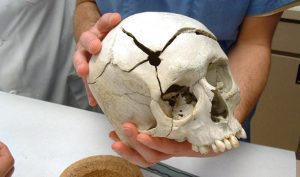Forensic Anthropology
 Forensic science is an outgrowth of anthropology, that discipline that has as its subject matter our own species. Its rapid growth in both application and popularity during the last 15 years has been due to an increase in the number of books, videos, films, college courses, and television programs focused on the subject matter. Interestingly enough, more females than males become practicing forensic anthropologists.
Forensic science is an outgrowth of anthropology, that discipline that has as its subject matter our own species. Its rapid growth in both application and popularity during the last 15 years has been due to an increase in the number of books, videos, films, college courses, and television programs focused on the subject matter. Interestingly enough, more females than males become practicing forensic anthropologists.
Academic Writing, Editing, Proofreading, And Problem Solving Services
Get 10% OFF with 24START discount code
The human animal is the focus of anthropology in general and forensics in particular. Emerging out of physical anthropology, forensic inquiry is primarily concerned with the human skeleton in order to establish the biological characteristics of a deceased individual and then, if possible, to make a positive identification of the corpse and, when necessary, to determine the cause or method of death and to suggest or confirm the murderer or murderers, when appropriate.
In light of forensic evidence, it may be determined that a death was due to murder or suicide or an accident, or the cause of death may remain unknown. The forensic anthropologist may also be an expert witness at a trial. Consequently, forensic science is an example of an applied area of general anthropology, that is, the use of anthropological data and methods for the purpose of solving a problem in the human world, whether this problem is recent or in the remote past. With its emphasis on application, forensic inquiry represents the relevant orientation of anthropology today.
In modern anthropology, humankind is seen as consisting of dynamic populations that are referred to as gene pools, and, therefore, the socalled human races of traditional anthropology are now replaced by viewing humankind as consisting of many changing ethnic groups. The biological variations in our species are explained in light of genetics and adaptations. All human beings are members of Homo sapiens sapiens; that is, each human individual belongs to the same genus, the same species, and the same subspecies. What physical differences that do exist in our species are meaningful only below the subspecies level of classification. This biological unity of humankind is ultimately supported by DNA evidence.
In particular, forensic anthropology focuses on differences in the human skeleton in order to determine the age, sex, height, weight, health, anomalies, and ethnic background of an individual, as well as other specific physical traits that may lead to a positive identification. Dental characteristics are very significant, as dental records may lead to a positive identification. By using clay models or line drawings by forensic artists, or computer generated three-dimensional images, as well as other advances in science and technology, a facial reconstruction is produced that is crucial in helping to achieve a positive identification.
To the trained eye of the forensic anthropologist, human bone can be distinguished from nonhuman bone; the same is true for blood and hair, and so on. These investigations rely on the old concept of variations on a theme. The theme is the human animal, while the variations are due to genetic and adaptive differences from person to person.
But, in general, forensic science may be used to identify an individual from a Civil War gravesite, determine the cause of death for the 5,000-year-old “Ice Man,” and unravel the mystery surrounding a mummy of ancient Egypt. Of course, these studies have no legal purpose, since each case is over 50 years old. Nevertheless, the findings from these studies will be valuable to anthropology in general and perhaps to medicine in particular.
The discipline of forensic science continues to progress, particularly in light of advances in chemistry, genetics, and computers. The old beliefs in phrenology, physiognomy, and criminal types are now replaced by facts and ideas grounded in modern scientific investigations and rational evaluations of the empirical evidence.




